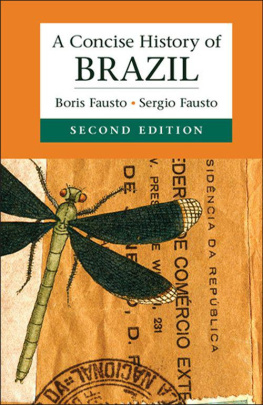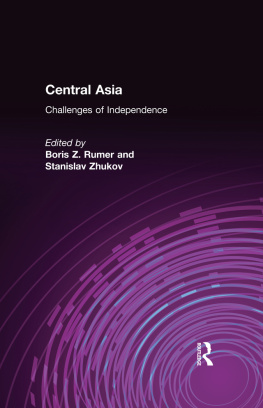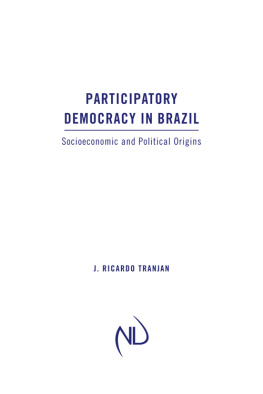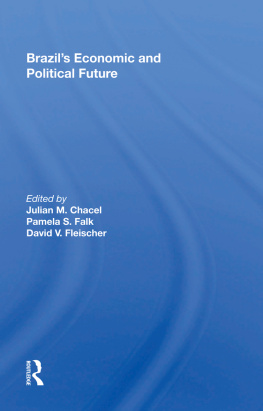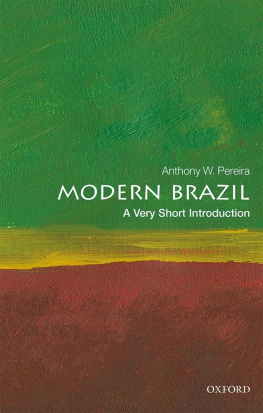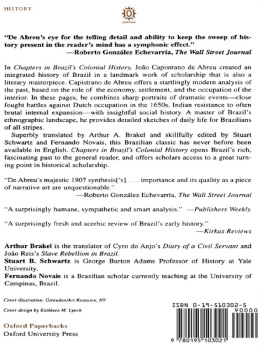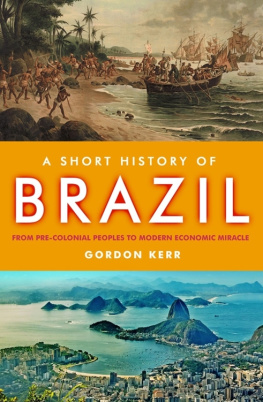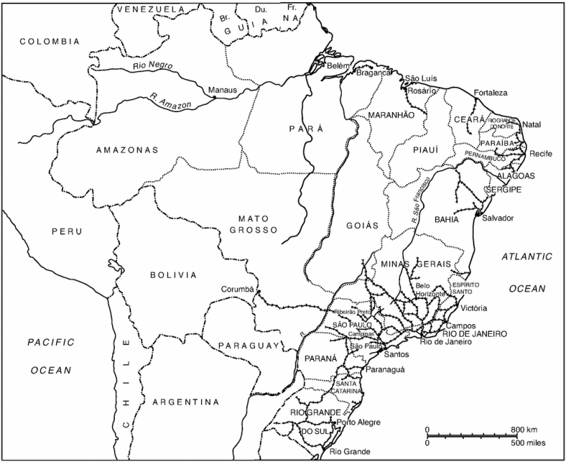A Concise History of Brazil
Second Edition
The second edition of A Concise History of Brazil offers a sweeping yet accessible history of Latin Americas largest country. Boris Fausto examines Brazils history from the arrival of the Portuguese in the New World through the long and sometimes rocky transition from independence in 1822 to democracy in the twentieth century. In a completely new chapter, his son Sergio Fausto, a prominent political scientist, brings the history up to the present, focusing on Brazils increasing global economic importance as well as its continued democratic development and the challenges the country faces to meet the higher expectations of its people.
BORIS FAUSTO is a renowned Brazilian historian and political scientist. He is a retired professor of political science at the University of So Paulo.
SERGIO FAUSTO is a political scientist and executive director of the Fernando Henrique Cardoso Institute, a Brazilian think tank.
32 Avenue of the Americas, New York, NY 10013-2473, USA
Cambridge University Press is part of the University of Cambridge.
It furthers the Universitys mission by disseminating knowledge in the pursuit of education, learning, and research at the highest international levels of excellence.
www.cambridge.org
Information on this title: www.cambridge.org/9781107635241
Boris Fausto 1999
Boris Fausto and Sergio Fausto 2014
This publication is in copyright. Subject to statutory exception and to the provisions of relevant collective licensing agreements, no reproduction of any part may take place without the written permission of Cambridge University Press.
First edition published 1999
Second edition published 2014
Printed in the United States of America
A catalog record for this publication is available from the British Library.
Library of Congress Cataloging in Publication Data
Fausto, Boris, 1930
[Historia concisa do Brasil. English]
A concise history of Brazil / Boris Fausto ; translated by
Arthur Brakel. Second edition.
pages cm
Includes bibliographical references and index.
ISBN 978-1-107-03620-8 (hardback) ISBN 978-1-107-63524-1 (pbk.)
1. Brazil History. I. Brakel, Arthur. II. Title.
F2521.F33213 2014
981dc23 2014006977
ISBN 978-1-107-03620-8 Hardback
ISBN 978-1-107-63524-1 Paperback
Cambridge University Press has no responsibility for the persistence or accuracy of URLs for external or third-party Internet Web sites referred to in this publication and does not guarantee that any content on such Web sites is, or will remain, accurate or appropriate.
Preface
Writing a synthetic history of Brazil for an English-language readership entails a set of challenges that I feel I must make explicit.
Beginning with the presupposition that there is scant familiarity with Brazilian history in the English-speaking world, I chose to emphasize historical narrative and introduce my readers to a body of knowledge which I consider fundamental. This choice has obvious advantages. Among them, it avoids taking gaps in readers knowledge for granted. However, at the same time, to lead readers along a path in a historical narrative is methodologically outdated and could result in a superficial understanding of important events.
I tried to minimize this shortcoming by combining narrative with discussions of central themes in the Brazilian historical process: e.g., the nature of Brazilian slavery, Brazils remaining united once it became an independent country, and the characteristics of its recent transition from an authoritarian government to a democratic one.
I have also sought to inform readers about the more significant historiographical controversies when such controversies make way for different interpretations of the past as well as when they demonstrate that history is a body of knowledge subject to constant reappraisal and refinement.
As they get into the book, readers will become more aware of my working premises, but there is at least one more that should be made clear. I have rejected two opposing tendencies in discussing the Brazilian historical process. On the one hand, I have rejected the tendency to consider Brazilian history as an evolutionary trend characterized by constant progress. This is a simplistic point of view that events in recent years have belied. On the other hand, I have also rejected the point of view that emphasizes inertia that suggests, for example, that problems caused by political patronage, by corruption, and by the states impositions on society have been the same and have not changed over the years.
Oddly, the latter proclivity has been associated both with revolutionary ideologies and with conservative outlooks. For revolutionaries, their view of political and social domination as, for all intents and purposes, one and the same leads them to the notion that efforts in the interest of gradual change are useless. They prefer abrupt cuts. Conservative thinkers who share this inertial point of view tend to be skeptical of change; or, in their more elaborated thinking, they are in favor of intervention by an authoritarian government whose objective is to impose new directions on the country.
My exposition takes a position contrary to both points of view. On a step-by-step basis, I have attempted to show that in the midst of continuity and accommodation, Brazil changes sometimes in the political sphere, sometimes socioeconomically, and at times in both arenas.
I should also point out that strictly speaking, cultural manifestations are not the object of this text. This deliberate omission is not meant to slight culture. I have decided to leave out culture because the interrelatedness of sociopolitical and cultural phenomena, owing to their complexity and importance, deserves to be dealt with in a book wholly on that subject.
Taking into account the purpose of this book, I have not included any notes containing marginal observations and references to sources. If this has made the text lighter reading, it has, simultaneously, presented me with a problem. Much of this book is indebted to the work of other authors which I have selected and incorporated for my own purposes. How can I not quote them without being unjust and without running the risk of being accused of plagiarism? I have tried to solve this dilemma in the Bibliography at the end. My references do not exhaust all the sources I consulted and do not mention all the basic bibliography. I have included only those texts I consulted in the writing of this book. Of course, my using them indicates that I consider them important.
Finally, I would like to thank my friend and colleague Herbert S. Klein, whose suggestions and considerations encouraged me to write this book.

